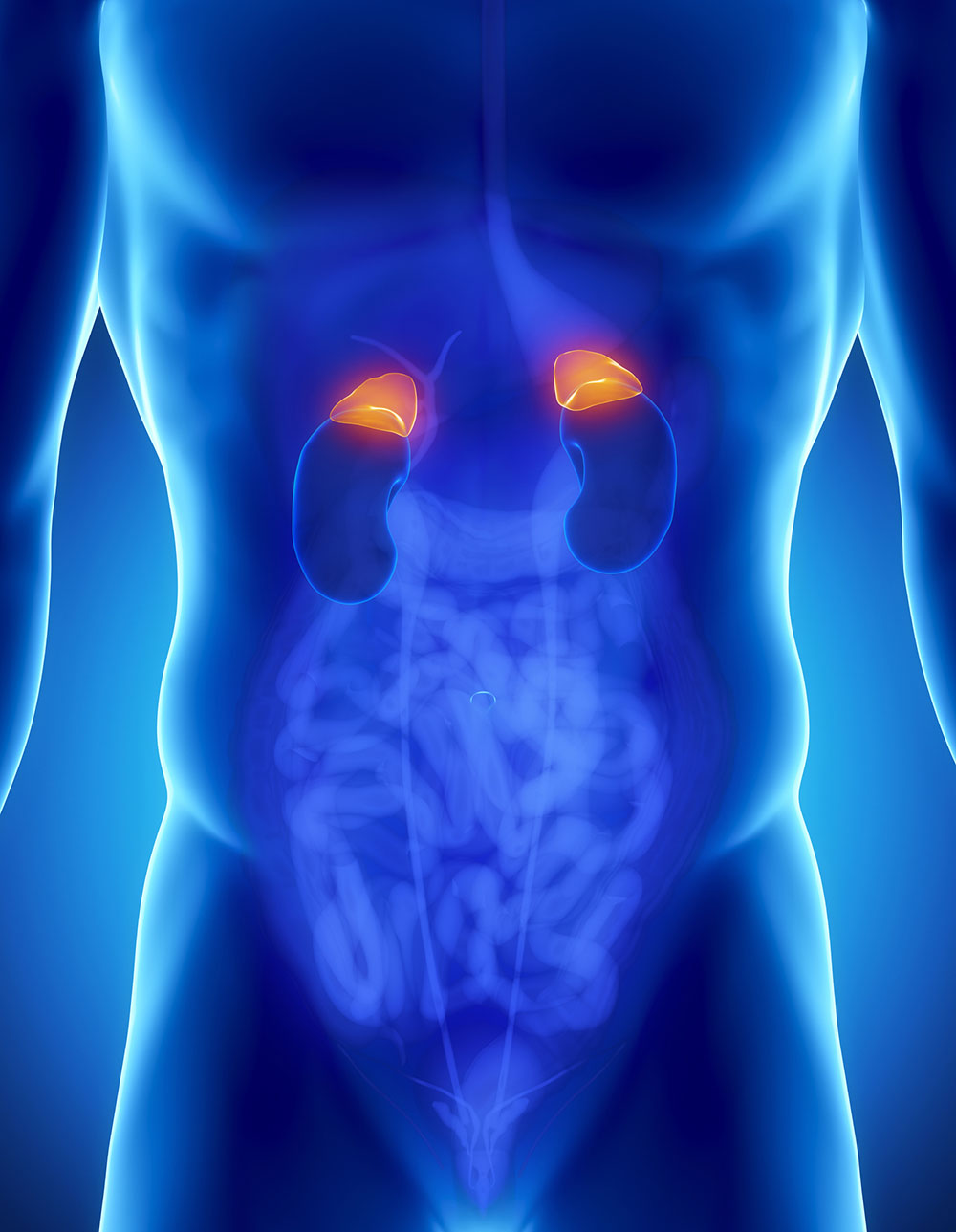Why Menopause Makes You Fat
One of the common symptoms associated with menopause - along with hot flashes and night sweats - is weight gain. At this point, it’s almost become a joke, and it’s certainly become an accepted and dreaded fact of aging.
But what is the reason for this connection between menopause and weight gain? And is there anything you can do about it? Well, in many cases the problem is estrogen dominance, which triggers cortisol and leads to muscle atrophy. That's a mouthful, I know, but the good news is that it's a problem we can solve.
Let’s dive in.

In this article:
What Is Menopause? Understanding The Basics
In order to properly understand the menopause transition, we have to start by talking about the ovaries. The ovaries make several hormones, two of them being estrogen and progesterone.
When you go through menopause - after perimenopause - your ovaries stop releasing eggs and stop producing those hormones. This usually happens at age 52, although there definitely can be a bit of variation here based on genetics, lifestyle, and other contributing factors.
At this time, women tend to start suffering from many "common" symptoms, including:
More belly fat
Loss of collagen
Atrophy
Hot flashes
Night Sweats
Vaginal dryness
Bone loss
Sleep problems
Decreased tolerance to stress
Facial hair
These, of course, wind up feeling like a "given" of getting older and entering this life transition. But they shouldn't be, and they're certainly not natural or unavoidable symptoms.
Instead, these symptoms come about because something - usually the adrenals - in the female body isn't working, as it should. Here's what happens: when a woman goes into menopause, her adrenals take over and start producing the hormones that were previously produced by the ovaries. To get that to happen, the hypothalamus sends out a signal to the adrenals saying hey, release the hormones. If all goes well, they do release and there isn't a symptom in sight.
The problems, though, begin to arise when the adrenals are fatigued. They don't answer the hypothalamus' call, and this leads to a bevy of issues.
So let's discuss how this relates specifically to menopausal weight gain.
What Causes Menopausal Weight Gain: Estrogen Dominance
Now, both estrogen and progesterone decrease during menopause. That said, progesterone levels drop more, which means that the ratio of estrogen becomes much higher than progesterone as women enter the transition.
This leaves many menopausal women in a state of estrogen dominance.
With estrogen dominance, many women experience:
Anxiety and irritability
Breast tenderness
Weepiness and depression
Cravings
Joint pain
Acne and cystic acne
Belly fat and weight gain in the hips, thighs, and stomach
Low libido
Fibroids
Cancer
Endometriosis
What Causes Estrogen Dominance?
In short, this also goes back to the weak adrenals. See, when a healthy woman enters perimenopause and menopause, the adrenal glands - located on top of the kidneys - take over for these hormonal changes in the ovaries. They actually begin producing the estrogen and progesterone that is no longer created by the ovaries.

The problem, though, is when those adrenals are weak and when they can’t do that job. They don’t produce the progesterone that is needed to balance this estrogen dominance, and the little bit of progesterone that the body does still produce is actually converted to cortisol, the stress hormone.
Why? Well, the adrenals main function is to combat stress. So, if they’re not functioning at 100%, they’ll use all the power they have to do only that. Which means they’ll rob the progesterone and turn it into cortisol.
This further exacerbates the estrogen dominance and forces other parts of the body to be depleted.
What’s more - your own fat makes estrogen and estrogen make fat. So the more fat you have, the more estrogen you’re going to create. The more estrogen you create, the more fat you’ll have. Yikes.
Now, “estrogen” is really three hormones: estradiol, estrone, and estriol. Estriol, to give some good news, is actually thought to be an anti-cancer hormone. It keeps estradiol, which is cancer causing, from becoming too high.
Estrone is the type of estrogen that occurs after menopause, and it’s made from androgens or testosterone. How do women get that testosterone in their bodies? Through Fat Storing Hormone. So any woman that has a problem with Fat Storing Hormone resistance will be producing that androgen, and that will lead to this estrogen dominance.
So, overall, estrogen is coming from a lot of places:
Your own fat
Hormones
Fat Storing Hormone
Synthetic medication
Hormones in animal products,
Xenoestrogens,
GMO foods like soy, corn, and beets
All that leads to estrogen dominance. And estrogen dominance leads to weight gain.
Estrogen Dominance Triggers Cortisol
That estrogen dominance will trigger another hormone in the brain - more specifically the hypothalamus - called CRH (short for corticotropin-releasing hormone). It’s basically a hormone that communicates to the pituitary gland - and to a pituitary hormone called ACTH - which then talks to the adrenals.
Sounds complicated, I know, but stick with me here.
This ultimately all means that when you have higher amounts of estrogen, it will trigger more cortisol. Cortisol is the main hormone that creates a weight gain problem. Your own fat - if you have too much fat - can also make cortisol just like it makes estrogen.
So, again, it’s a self-perpetuating cycle that makes weight loss impossible.
The Big Weight Gain Culprit: Cortisol
Now here's the thing: cortisol isn't always bad. In fact, when it's at the right levels, cortisol can help:
Manage how your body uses carbs, fats, and protein
Regulate blood pressure
Keep inflammation down
Control your sleep/wake cycle
Boost energy so you can handle stress.
It also, of course, is in charge of the "fight or flight" response, which is a very necessary and useful human reaction.
Instead, the problem is excess cortisol. Excess cortisol is very catabolic, meaning that it breaks down muscle tissue and it’s very destructive to your muscles and your body composition. Ultimately, it actually turns muscle tissue into glucose or sugar.
That, in turn, is converted through Fat Storing Hormone into fat cells.
That’s why many women that go through menopause end up with atrophy, loss of muscle mass, and increased body fat. Their muscle is quite literally being broken down and converted into sugar.
Yet, in their minds, they think this is all just excess fat. I can't maintain a healthy weight in midlife. I have to make peace with menopausal weight gain. That's just not true: the fact is that it’s a complex chemical reaction going on in their bodies that is leading to atrophy and preventing successful weight loss.
Cortisol Causes Menopausal Atrophy
When we're talking about atrophy, we're not simply talking about weak muscles or under-exercised muscles. Instead, we're talking about muscles wasting away in the exact same way that they would on someone that's suffering from some form of paralysis.
So it almost goes without saying that age-related atrophy is not a little thing. It's actually a major problem that can ultimately be symptomatically similar to osteoporosis, where you’re actually having thinning of the bones and you’re actually losing muscle fiber.
Three things cause atrophy in a menopausal woman:
Cortisol - The adrenal stress hormone. This is possibly triggered by stress without sleep
Inactivity - Say you haven’t worked out for 30 years. It might take some months to get that back.
Fat Storing Hormone resistance - Your cells have Fat Storing Hormone resistance, meaning that they won’t let the Fat Storing Hormone connect anymore. Well, Fat Storing Hormone controls the protein in the cell, so if you’re pre-diabetic or diabetic, and you can’t allow the Fat Storing Hormone to go in there, that could be the reason why you’re not improving your atrophy.
The Solution: Lower Estrogen and Fix Atrophy
First thing’s first: you have to reduce the amount of estrogen in your body as much as possible in order to correct the dominance and stop weight gain. You can do this by consuming:
Organic vegetables
Hormone-free meats and meats that are grass-fed or pasteurized
Aromatase inhibitors: cruciferous vegetables, iodine (from sea kelp), DIM, nettle root
Chaste tree/black cohosh
As a last resort: progesterone cream
Cortisol support
Next, you have to fix the problems going on with the rest of your body and:
Reverse the atrophy and restore your metabolic rate
Deal with the actual body fat and jump-start weight loss by adopting some kind of moderate-intensity exercise or physical activity. This can include strength training or another weight-bearing exercise. Remember, though, that the key is to stick with it and pick something that you will actually incorporate into your lifestyle.
Address the adrenals and build them back up so they can create the hormones that women are supposed to have post-menopause (and stop creating excess cortisol).
Lower your blood sugar and address your Fat Storing Hormone dominance
Adopt a more low-fat and low-calorie diet plan
Overall, just know that menopause symptoms and menopause weight gain don’t have to happen. They are treatable, and weight loss is achievable. Contact us if you have any more questions today.
Up Next:
Previous blog
Stop Rusting Out Your BrainNext blog
Iodine Beyond the Thyroid
Popular
08/21/2024
55.7K views
02/23/2025
46.8K views
11/18/2024
281K views
03/18/2024
11/21/2022




